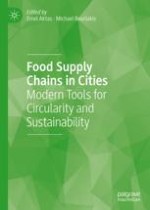2020 | OriginalPaper | Chapter
The Role of Informal and Semi-Formal Waste Recycling Activities in a Reverse Logistics Model of Alternative Food Networks
Authors : Luis Kluwe de Aguiar, Louise Manning
Published in: Food Supply Chains in Cities
Publisher: Springer International Publishing
Activate our intelligent search to find suitable subject content or patents.
Select sections of text to find matching patents with Artificial Intelligence. powered by
Select sections of text to find additional relevant content using AI-assisted search. powered by
